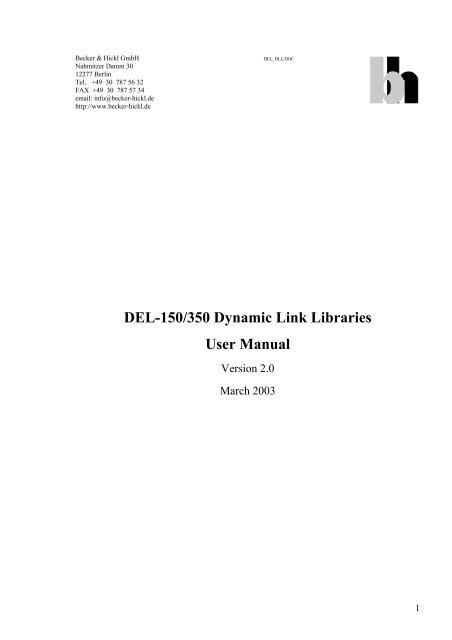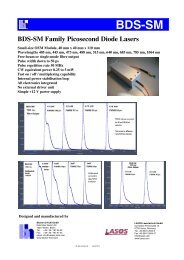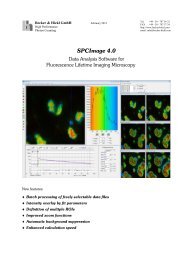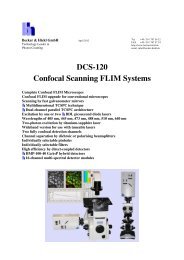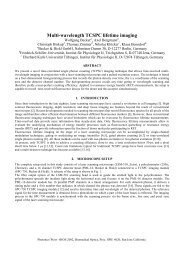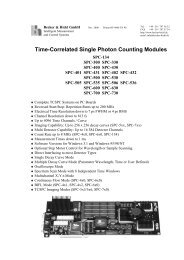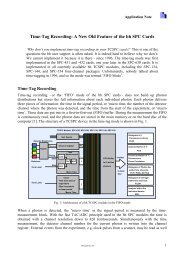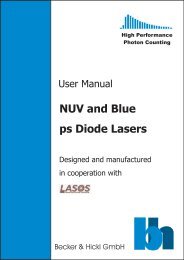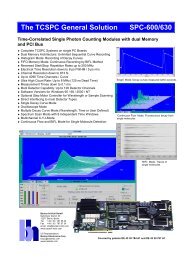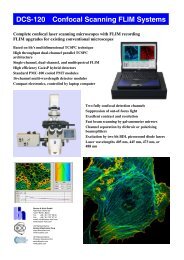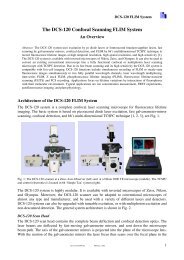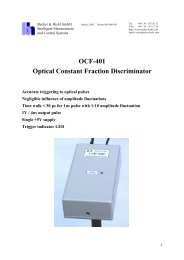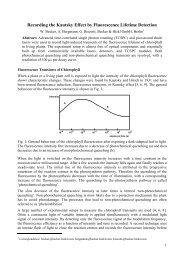DEL-150/350 Dynamic Link Libraries User Manual - Becker & Hickl
DEL-150/350 Dynamic Link Libraries User Manual - Becker & Hickl
DEL-150/350 Dynamic Link Libraries User Manual - Becker & Hickl
You also want an ePaper? Increase the reach of your titles
YUMPU automatically turns print PDFs into web optimized ePapers that Google loves.
<strong>Becker</strong> & <strong>Hickl</strong> GmbH<br />
Nahmitzer Damm 30<br />
12277 Berlin<br />
Tel. +49 30 787 56 32<br />
FAX +49 30 787 57 34<br />
email: info@becker-hickl.de<br />
http://www.becker-hickl.de<br />
<strong>DEL</strong>_DLL.DOC<br />
<strong>DEL</strong>-<strong>150</strong>/<strong>350</strong> <strong>Dynamic</strong> <strong>Link</strong> <strong>Libraries</strong><br />
<strong>User</strong> <strong>Manual</strong><br />
Version 2.0<br />
March 2003<br />
1
Introduction<br />
The <strong>DEL</strong> 32 bit <strong>Dynamic</strong> <strong>Link</strong> Library contains all functions to control the <strong>DEL</strong>-<strong>150</strong>(<strong>350</strong>) ps<br />
Delay Generator modules. The functions work under Windows 9x/ME/NT/2000/XP. Up to<br />
four <strong>DEL</strong> modules can be controlled using the <strong>DEL</strong> DLL. The program which calls the DLLs<br />
must be compiled with the compiler option 'Structure Alignment' set to '1 Byte'.<br />
The distribution disks contain the following files:<br />
<strong>DEL</strong>DLL32.DLL<br />
<strong>DEL</strong>DLL32.LIB<br />
<strong>DEL</strong>_DEF.H<br />
<strong>DEL</strong><strong>150</strong>.INI<br />
<strong>DEL</strong>_DLL.DOC<br />
USE_<strong>DEL</strong>.XXX<br />
dynamic link library main file<br />
import library file for Microsoft Visual C/C++, Borland C/C++,<br />
Watcom C/C++ and Symantec C/C++ compilers<br />
Include file containing type definitions, functions prototypes and preprocessor<br />
statements<br />
<strong>DEL</strong> DLL initialisation file<br />
This description file<br />
Set of files to compile and run a simple example of using the <strong>DEL</strong><br />
DLL functions. The source file of the example is the file use_del.c.<br />
The example was originally prepared under Borland C/C++, V.4.52.<br />
For other compilers, please choose the correct import library file to<br />
link.<br />
There is no special installation procedure required. Simply execute the setup program from<br />
the 1st distribution diskette and follow its instructions.<br />
2
<strong>DEL</strong>-DLL Functions list<br />
The following functions are implemented in the <strong>DEL</strong>-DLL:<br />
Initialisation functions:<br />
<strong>DEL</strong>_init<br />
<strong>DEL</strong>_get_id<br />
<strong>DEL</strong>_test_id<br />
<strong>DEL</strong>_get_version<br />
<strong>DEL</strong>_set_mode<br />
<strong>DEL</strong>_get_mode<br />
<strong>DEL</strong>_get_init_status<br />
<strong>DEL</strong>_get_module_info<br />
<strong>DEL</strong>_test_module<br />
<strong>DEL</strong>_get_error_string<br />
Setup functions:<br />
<strong>DEL</strong>_get_parameters<br />
<strong>DEL</strong>_set_parameters<br />
<strong>DEL</strong>_set_slope<br />
<strong>DEL</strong>_set_threshold<br />
<strong>DEL</strong>_set_output_pulse_width<br />
<strong>DEL</strong>_set_output_pulse_level<br />
<strong>DEL</strong>_invert_output_pulse<br />
<strong>DEL</strong>_set_delay_range<br />
<strong>DEL</strong>_set_delay<br />
<strong>DEL</strong>_set_start_delay<br />
<strong>DEL</strong>_set_end_delay<br />
<strong>DEL</strong>_set_scan_repeat<br />
<strong>DEL</strong>_set_time_per_step<br />
<strong>DEL</strong>_get_eeprom_data<br />
<strong>DEL</strong>_write_eeprom_data<br />
<strong>DEL</strong>_get_adjust_parameters<br />
<strong>DEL</strong>_set_adjust_parameters<br />
<strong>DEL</strong>_load_setup<br />
<strong>DEL</strong>_save_setup<br />
<strong>DEL</strong>_activate_12V<br />
Scanning control functions:<br />
<strong>DEL</strong>_start_scan<br />
<strong>DEL</strong>_stop_scan<br />
<strong>DEL</strong>_reset_scan<br />
Status functions:<br />
<strong>DEL</strong>_test_if_scanning<br />
<strong>DEL</strong>_get_delay<br />
3
<strong>DEL</strong>_test_if_triggered<br />
Functions listed above must be called with C calling convention which is default for C and<br />
C++ programs.<br />
Identical set of functions is available for environments like Visual Basic which requires<br />
_stdcall calling convention. Names of these functions have ‘std’ letters after ‘<strong>DEL</strong>’,<br />
for example, <strong>DEL</strong>std_get_delay it is _stdcall version of <strong>DEL</strong>_get_delay.<br />
Description and behaviour of these functions are identical to the functions from the first<br />
(default) set – the only difference is calling convention.<br />
4
Application Guide<br />
Initialisation of the <strong>DEL</strong> Parameters<br />
Before the <strong>DEL</strong> module can be used the parameter values must be written into the internal<br />
structures of the DLL functions (not directly visible from the user program) and sent to the<br />
control registers of the <strong>DEL</strong> module. This is accomplished by the function <strong>DEL</strong>_init.<br />
The <strong>DEL</strong> DLL functions simultaneously control up to four <strong>DEL</strong>-<strong>150</strong>(<strong>350</strong>) modules.<br />
The <strong>DEL</strong>_init function<br />
- reads the parameter values from a specified file<br />
- checks and recalculates the parameters depending on the hardware restrictions and the<br />
adjust parameters from the EEPROM on <strong>DEL</strong> module<br />
- sends the parameter values to the <strong>DEL</strong> control registers<br />
- performs a hardware test of the <strong>DEL</strong> module<br />
- reads the parameter values from the ‘auto.cfg’ file and sends the values to the <strong>DEL</strong> control<br />
registers. For this feature the ‘use_auto_setup’ parameter in the ‘ini’ file must be set to 1<br />
and the ‘auto.cfg’ file must exists in DLL directory.<br />
The initialisation file is an ASCII file with a structure as shown below. We recommend either<br />
to use the file ‘del<strong>150</strong>.ini’ for initialisation or to start with ‘del<strong>150</strong>.ini’ and to introduce the<br />
desired changes.<br />
; <strong>DEL</strong><strong>150</strong> initialisation file<br />
; <strong>DEL</strong> parameters have to be included in .ini file only when parameter<br />
; value is different from default.<br />
[base]<br />
simulation = 0 ; 0 - hardware mode(default) ,<br />
; >0 - simulation mode (see del_def.h for possible values)<br />
baseadr = 0x380 ;base I/O address (0 ... 0x3FC,default 0x380)<br />
use_auto_setup = 0<br />
;load (1) or not (0- default) parameters from setup file ‘auto.cfg’<br />
; at the end of initialisation<br />
pci_card_no = 0<br />
pci_bus_no = -1<br />
; number of the module on PCI bus if <strong>DEL</strong>-<strong>350</strong> module<br />
; 0 - 3, default -1 ( ISA module - <strong>DEL</strong>-<strong>150</strong>)<br />
; PCI bus on which <strong>DEL</strong>-<strong>350</strong> modules will be looking for<br />
; 0 - 255, default -1 ( all PCI busses will be scanned)<br />
[device]<br />
slope = 1<br />
;input signal slope -1 - negative, 1 - positive,<br />
; 0 - input disabled (default)<br />
threshold = 0.08 ;input signal threshold [V] (-2V .. +2V , default 1.0 V )<br />
out_width = 200.0 ;output signal width [ns] (2 ... 2000, default 10. )<br />
out_level = 1<br />
;output signal level 0 - TTL ,1 - NIM (default)<br />
delay_range= 10. ;delay range [ns] (10 ... 100000 , default 100. )<br />
delay = 5.0 ;delay value [ns] ( 0 ... delay range , default 50. )<br />
start_delay = 0.0 ;scan start delay value [ns]( 0 ... delay range , default 0.0 )<br />
end_delay = 5.0 ;scan end delay value [ns] ( 0 ... delay range , default 50. )<br />
time_per_step = 0.001<br />
; time per one scan step [sec]<br />
; ( 1e-6 ... 81.92 , default 0.001 )<br />
scan_repeat= 0<br />
; automatic repeat of scan action (0 -off (default) ,1 -on)<br />
out12V = 1 ; 12V output active(1, default) / inactive ( 0)<br />
5
; - only for <strong>DEL</strong>-<strong>350</strong> modules<br />
The <strong>DEL</strong>_init function initialises one <strong>DEL</strong> module (normally the first one) depending on<br />
‘pci_card_no’ value in .ini file. Module number to be used in subsequent calls to DLL<br />
functions is normally 0 and can be found by checking which module is in_use ( see<br />
<strong>DEL</strong>_get_module_info function) .<br />
To initialise more (or other ) <strong>DEL</strong> modules ( if there are any ) <strong>DEL</strong>_set_mode function is<br />
used.<br />
After calling the <strong>DEL</strong>_init function the measurement parameters from the initialisation file<br />
are present in the module control registers and in the internal data structures of the DLLs. To<br />
give the user access to the parameters, the function <strong>DEL</strong>_get_parameters is provided. This<br />
function transfers the parameter values from the internal structures of the DLLs into a<br />
structure of the type ‘<strong>DEL</strong>data’ (see del_def.h) which has to be defined by the user. The<br />
parameter values in this structure are described below.<br />
unsigned short base_adr base I/O address<br />
short use_auto_setup;<br />
auto.cfg file was loaded during initialisation<br />
short pci_card_no;<br />
no of PCI module(0-3) or -1 for ISA module<br />
unsigned short test_eep; test EEPROM or not<br />
float threshold;<br />
input signal threshold [V]<br />
float out_width;<br />
output signal width [ns]<br />
short out_level;<br />
output signal level 0 -TTL ,1 - NIM<br />
short out_invert; output signal inverted (1) or not (0)<br />
float delay_range;<br />
delay range [ns]<br />
float delay;<br />
delay [ns]<br />
float start_delay;<br />
start delay for scanning [ns]<br />
float end_delay;<br />
end delay for scanning [ns]<br />
float time_per_step;<br />
time per one step change of delay<br />
during scanning [s]<br />
(one step change = 4095 / actual delay range )<br />
short steps;<br />
number of steps in scanning action<br />
short scan_repeat;<br />
automatically repeat scanning ( or not)<br />
short slope;<br />
input signal slope 0 - positive,<br />
0 - input signal disabled - device not active<br />
short out12V;<br />
12V output active(1, default) / not active(0)<br />
- only for <strong>DEL</strong>-<strong>350</strong> modules<br />
To send the hardware parameters back to the DLLs and to the <strong>DEL</strong> module (e.g. after<br />
changing parameter values) the function <strong>DEL</strong>_set_parameters is used. This function checks<br />
and - if required - recalculates all parameter values due to cross dependencies and hardware<br />
restrictions. Therefore, it is recommended to read the parameter values by<br />
<strong>DEL</strong>_get_parameters after calling <strong>DEL</strong>_set_parameters.<br />
The current state of the internal <strong>DEL</strong>data structure can be stored in a setup file (extension:<br />
.cfg) by the function <strong>DEL</strong>_save_setup. A previously saved state can be to a <strong>DEL</strong> module by<br />
calling the <strong>DEL</strong>_load_setup function.<br />
Single parameter values can be transferred to the DLL and module level by parameter specific<br />
functions (e.g. for input signal slope use <strong>DEL</strong>_set_slope ).<br />
Error Handling<br />
Each <strong>DEL</strong> DLL function returns an error status. Return values >= 0 indicate error free<br />
execution. A value < 0 indicates that an error occurred during the execution. The meaning of a<br />
6
particular error code can be found in del_def.h file and can be read using<br />
<strong>DEL</strong>_get_error_string. We recommend to check the return value after each function call.<br />
7
Description of the <strong>DEL</strong> DLL Functions<br />
--------------------------------------------------------------------------------------------------------<br />
short <strong>DEL</strong>_init (char * ini_file)<br />
--------------------------------------------------------------------------------------------------------<br />
Input parameters: ini_file: pointer to a string the containing initialisation file name<br />
including file name and extension)<br />
Return value: returns error code, 0 - success,
The initialisation file is an ASCII file with a structure as shown below. We recommend either<br />
to use the file del<strong>150</strong>.ini for initialisation or to start with del<strong>150</strong>.ini and to introduce the<br />
desired changes.<br />
; <strong>DEL</strong><strong>150</strong> initialisation file<br />
; <strong>DEL</strong> parameters have to be included in .ini file only when parameter<br />
; value is different from default.<br />
[base]<br />
simulation = 0 ; 0 - hardware mode(default) ,<br />
; >0 - simulation mode (see del_def.h for possible values)<br />
baseadr = 0x380 ;base I/O address (0 ... 0x3FC,default 0x380)<br />
use_auto_setup = 0<br />
;load (1) or not (0- default) parameters from setup file ‘auto.cfg’<br />
; at the end of initialisation<br />
pci_card_no = 0<br />
pci_bus_no = -1<br />
; number of the module on PCI bus if <strong>DEL</strong>-<strong>350</strong> module<br />
; 0 - 3, default -1 ( ISA module - <strong>DEL</strong>-<strong>150</strong>)<br />
; PCI bus on which <strong>DEL</strong>-<strong>350</strong> modules will be looking for<br />
; 0 - 255, default -1 ( all PCI busses will be scanned)<br />
[device]<br />
slope = 1<br />
;input signal slope -1 - negative, 1 - positive,<br />
; 0 - input disabled (default)<br />
threshold = 0.08 ;input signal threshold [V] (-2V .. +2V , default 1.0 V )<br />
out_width = 200.0 ;output signal width [ns] (2 ... 2000, default 10. )<br />
out_level = 1<br />
;output signal level 0 - TTL ,1 - NIM (default)<br />
delay_range = 10. ;delay range [ns] (10 ... 100000 , default 100. )<br />
delay = 5.0 ;delay value [ns] ( 0 ... delay range , default 50. )<br />
start_delay = 0.0 ;scan start delay value [ns]( 0 ... delay range , default 0.0 )<br />
end_delay = 5.0 ;scan end delay value [ns] ( 0 ... delay range , default 50. )<br />
time_per_step = 0.001<br />
; time per one scan step [sec]<br />
; ( 1e-6 ... 81.92 , default 0.001 )<br />
scan_repeat = 0<br />
; automatic repeat of scan action (0 -off (default) ,1 -on)<br />
out12V = 1 ; 12V output active(1, default) / inactive ( 0)<br />
After calling the <strong>DEL</strong>_init function the measurement parameters from the initialisation file<br />
are present in the module control registers and in the internal data structures of the DLLs.<br />
--------------------------------------------------------------------------------------------------------<br />
short <strong>DEL</strong>_get_id (short mod_no, short far* id)<br />
--------------------------------------------------------------------------------------------------------<br />
Input parameters:<br />
mod_no<br />
0 .. 3, <strong>DEL</strong> module number<br />
*id pointer to the identification code<br />
Return value:<br />
0 no errors,
initialisation by <strong>DEL</strong>_init. Therefore, a call of ‘<strong>DEL</strong>_get_id’ is not normally required for<br />
standard applications.<br />
--------------------------------------------------------------------------------------------------------<br />
short <strong>DEL</strong>_test_id (short mod_no)<br />
--------------------------------------------------------------------------------------------------------<br />
Input parameters:<br />
mod_no<br />
0 .. 3, <strong>DEL</strong> module number<br />
Return value:<br />
0 correct id ,
1 – means that the module will be initialised and locked<br />
When the Hardware Mode is requested for each of 4 possible modules:<br />
-if ‘in_use’ entry = 1 : the proper module is locked and initialised (if it wasn’t) with<br />
the initial parameters set (from ini_file) but only when it was not locked by another<br />
application or when ‘force_use’ = 1.<br />
-if ‘in_use’ entry = 0 : the proper module is unlocked and cannot be used further.<br />
When one of the simulation modes is requested for each of 4 possible modules:<br />
-if ‘in_use’ entry = 1 : the proper module is initialised (if it wasn’t) with the initial<br />
parameters set (from ini_file).<br />
-if ‘in_use’ entry = 0 : the proper module is unlocked and cannot be used further.<br />
Errors during the module initialisation can cause that the module is excluded from use.<br />
Use the function <strong>DEL</strong>_get_init_status and/or <strong>DEL</strong>_get_module_info to check which modules<br />
are correctly initialised and can be use further.<br />
Use the function <strong>DEL</strong>_get_mode to check which mode is actually set. Possible ‘mode’ values<br />
are defined in the del_def.h file.<br />
The procedure is used to change the DLL operating mode from ‘Hardware Mode’ to<br />
‘Simulation Mode’ or vice versa. The simulation mode is used to run the software without the<br />
<strong>DEL</strong> module or in case of hardware errors found during the <strong>DEL</strong>_init call. Use<br />
<strong>DEL</strong>_get_mode to check the actual mode after the call to <strong>DEL</strong>_set_mode.<br />
--------------------------------------------------------------------------------------------------------<br />
short <strong>DEL</strong>_get_mode (void)<br />
--------------------------------------------------------------------------------------------------------<br />
Input parameters:<br />
none<br />
Return value:<br />
DLL operation mode<br />
The procedure returns the current DLL operation mode. Possible ‘mode’ values are defined in<br />
the del_def.h file:<br />
#define <strong>DEL</strong>_HARD 0 /* hardware mode */<br />
#define <strong>DEL</strong>_SIMUL<strong>150</strong> <strong>150</strong> /* simulation mode of <strong>DEL</strong>-<strong>150</strong> module */<br />
#define <strong>DEL</strong>_SIMUL<strong>350</strong> <strong>350</strong> /* simulation mode of <strong>DEL</strong>-<strong>350</strong> module */<br />
--------------------------------------------------------------------------------------------------------<br />
short <strong>DEL</strong>_get_init_status(short mod_no)<br />
--------------------------------------------------------------------------------------------------------<br />
Input parameters:<br />
mod_no<br />
0 .. 3, <strong>DEL</strong> module number<br />
Return value: initialisation result code of the <strong>DEL</strong> module ‘mod_no’<br />
Description:<br />
The procedure returns the initialisation result code set by the function <strong>DEL</strong>_init or<br />
<strong>DEL</strong>_set_mode. The possible values are shown below (see also del_def.h):<br />
11
INIT_OK 0 no error<br />
INIT_NOT_DONE -1 init not done<br />
INIT_WRONG_EEP_CHKSUM -2 wrong EEPROM checksum<br />
INIT_WRONG_MOD_ID -3 wrong module identification code<br />
INIT_WRONG_TRIGGER -4 trigger test failed<br />
INIT_WRONG_DACS -5 DAC's test failed<br />
INIT_CANT_OPEN_PCI_CARD -6 cannot open PCI card<br />
INIT_WINDRVR_VER -7 incorrect WinDriver version<br />
INIT_MOD_IN_USE -8 module in use (locked) - cannot initialise<br />
INIT_ WRONG_LICENSE -9 wrong or missing license key<br />
--------------------------------------------------------------------------------------------------------<br />
short <strong>DEL</strong>_get_module_info(short mod_no, <strong>DEL</strong>ModInfo * mod_info);<br />
--------------------------------------------------------------------------------------------------------<br />
Input parameters:<br />
mod_no<br />
0 .. 3, <strong>DEL</strong> module number<br />
*mod_info pointer to result structure (type <strong>DEL</strong>ModInfo)<br />
Return value: 0 no errors,
*dest_string<br />
max_length<br />
pointer to destination string<br />
max number of characters which can be copied to ‘dest_string’<br />
Return value: 0: no errors,
--------------------------------------------------------------------------------------------------------<br />
short <strong>DEL</strong>_set_parameters (short mod_no, <strong>DEL</strong>data far *data)<br />
--------------------------------------------------------------------------------------------------------<br />
Input parameters:<br />
mod_no<br />
data<br />
0 .. 3, <strong>DEL</strong> module number<br />
pointer to result structure (type <strong>DEL</strong>data)<br />
Return value:<br />
0 no errors ,
Description:<br />
The procedure sets the trigger threshold for the <strong>DEL</strong> module defined by ‘mod_no’.<br />
--------------------------------------------------------------------------------------------------------<br />
short <strong>DEL</strong>_set_output_pulse_width (short mod_no, float width)<br />
--------------------------------------------------------------------------------------------------------<br />
Input parameters:<br />
mod_no<br />
width<br />
0 .. 3, <strong>DEL</strong> module number<br />
new width value (2 to 2000 [ns])<br />
Return value:<br />
0 no errors ,
--------------------------------------------------------------------------------------------------------<br />
short <strong>DEL</strong>_set_delay_range (short mod_no, float range)<br />
--------------------------------------------------------------------------------------------------------<br />
Input parameters:<br />
mod_no<br />
range<br />
0 .. 3, <strong>DEL</strong> module number<br />
new range value (10 to 100000 [ns])<br />
Return value:<br />
0 no errors ,
Description:<br />
The procedure sets the start delay value used in the scanning mode. The module to which the<br />
parameter applies is defined by ‘mod_no’.<br />
--------------------------------------------------------------------------------------------------------<br />
short <strong>DEL</strong>_set_end_delay (short mod_no, float delay)<br />
--------------------------------------------------------------------------------------------------------<br />
Input parameters:<br />
mod_no<br />
delay<br />
0 .. 3, <strong>DEL</strong> module number<br />
new end delay value (0 delay range [ns])<br />
Return value:<br />
0 no errors ,
Description:<br />
The procedure sets the time per delay step in the scanning mode. The module to which the<br />
parameter applies is defined by ‘mod_no’.<br />
--------------------------------------------------------------------------------------------------------<br />
short <strong>DEL</strong>_get_eeprom_data (short mod_no, <strong>DEL</strong>_EEP_Data far *eep_data)<br />
--------------------------------------------------------------------------------------------------------<br />
Input parameters:<br />
mod_no<br />
0 .. 3, <strong>DEL</strong> module number<br />
eep_data pointer to result structure<br />
Return value:<br />
0 no errors ,
Description:<br />
The structure 'adjpara' is filled with the adjust parameters that are currently in use. The<br />
parameters can either be previously loaded from the EEPROM by <strong>DEL</strong>_init or<br />
<strong>DEL</strong>_get_eeprom_data or - not recommended - set by <strong>DEL</strong>_set_adust_parameters.<br />
The structure "<strong>DEL</strong>_Adjust_Para" is defined in the file del_def.h.<br />
Normally, the adjust parameters need not be read explicitly because the EEPROM is read<br />
during <strong>DEL</strong>_init and the adjust values are taken into account when the <strong>DEL</strong> module registers<br />
are loaded.<br />
--------------------------------------------------------------------------------------------------------<br />
short <strong>DEL</strong>_set_adjust_parameters (short mod_no, <strong>DEL</strong>_Adjust_Para far * adjpara)<br />
--------------------------------------------------------------------------------------------------------<br />
Input parameters:<br />
mod_no<br />
0 .. 3, <strong>DEL</strong> module number<br />
adjpara<br />
pointer to result structure<br />
Return value:<br />
0 no errors ,
Return value:<br />
0 no errors ,
--------------------------------------------------------------------------------------------------------<br />
short <strong>DEL</strong>_stop_scan (short mod_no)<br />
--------------------------------------------------------------------------------------------------------<br />
Input parameters:<br />
mod_no<br />
0 .. 3, <strong>DEL</strong> module number<br />
Return value:<br />
0 no errors ,
--------------------------------------------------------------------------------------------------------<br />
short <strong>DEL</strong>_get_delay (short mod_no, float *delay)<br />
--------------------------------------------------------------------------------------------------------<br />
Input parameters:<br />
mod_no<br />
0 .. 3, <strong>DEL</strong> module number<br />
delay<br />
pointer to variable which will be filled with delay value<br />
Return value:<br />
0 no errors ,


